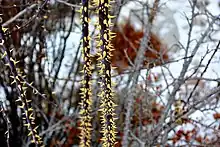خار
Mazanderani
Persian
Etymology
From Middle Persian hʾl (xār, “thorn”), related to Sanskrit खर (khara, “sharp, rough, harsh”)).[1] Compare Manichaean Middle Persian xʾr (xār).
Pronunciation
- (Classical Persian) IPA(key): [xɑːɾ]
- (Dari, formal) IPA(key): [xɑːɾ]
- (Kabuli) IPA(key): [xɑːɾ]
- (Hazaragi) IPA(key): [xɔːɾ]
- (Iran, formal) IPA(key): [xɒːɹ]
- (Tajik, formal) IPA(key): [χɔɾ]
| Readings | |
|---|---|
| Classical reading? | xār |
| Dari reading? | xār |
| Iranian reading? | xâr |
| Tajik reading? | xor |
Derived terms
- خارشُتُر (xâr-e šotor)
Descendants
- → Urdu: خار (xār)
References
- MacKenzie, D. N. (1971) “xār”, in A concise Pahlavi dictionary, London, New York, Toronto: Oxford University Press, page 94
- “artichoke”, in The American Heritage Dictionary of the English Language, 5th edition, Boston, Mass.: Houghton Mifflin Harcourt, 2016, →ISBN.
Urdu

a plant with خار (xār, "thorn, prickle" on it, Kirthar Mountain

the Siachen plant with golden خار, extant to the glaciers of northern Pakistan
Etymology
From Classical Persian خار (xār, “thorn”), from Middle Persian hʾl (xār, “thorn”).
Pronunciation
- (Standard Urdu) IPA(key): /xɑːɾ/
Declension
| Declension of خار | ||
|---|---|---|
| singular | plural | |
| direct | خار (xār) | خار (xār) |
| oblique | خار (xār) | خاروں (xārō̃) |
| vocative | خار (xār) | خارو (xārō) |
Derived terms
Derived terms
- خارِ ماہی (xār-e-mahī, “fish hook”)
- خارِ عَقْرَب (xār-e-'aqrab, “scorpion sting”)
- خار راہ (xār-e-rāh, “obstacle, thorn in the path”)
- خار بَنْد (xār-band, “barbed-wire fence”)
- خار بَسْت (xār-bast, “bound by thorn”)
- خار و خَس (xār-o-xas, “trash, rubbish, sweepings”)
- خار خُشْک (xār-e-xusk, “dry thorn”)
- خارِ پُشْت (xār-e-pust, “a type of Indo-Persian weapon, hedgehog, porcupine, jackfruit”)
- خارِ شُتُر (xār-e-sutur, “Echimops Echinatu”)
- خارَک (xārak, “little thorn, dried or unripe dates”)
- خارِ تَرازُو (xār-e-tarāzū, “the hook of a weighting scale”)
- خار دینا (xār dēnā, “to hurt”)
- خارِش (xāris, “itch”)
- خارِ مُغِیلاں (xār-e-mugīlañ, “acacia thorn”)
- خارِسْتان (xāristān, “field of thorns”)
- خار دار تار (xār-dār-tār, “barbed wire”)
- گُلِ بے خار (gul-e-bexār, “thornless rose, a harmless thing”)
- بے خار (bexār, “fearless, young, without thorns”)
- نوک خار (nōk-e-xār, “tip of the thorn, spearhead of the thorn”)
- خارا شِکَنی (xārā-šikānī, “breaking thorn, hard work”)
- خارا شِگاف (xārā-šigāf, “stone-spliting, very sharp”)
- خارا تَراشی (xara-tarāšī, “the work of stone carving”)
- خارزار (xārzār, “place of thorns or thistles”)
- خاردار (xārdār, “thorny, prickly, bearded, troublesome, arduous”)
- وادیٔ پُر خار (vādī-e-por-xār, “valley of dangers, the path of hardship”)
This article is issued from Wiktionary. The text is licensed under Creative Commons - Attribution - Sharealike. Additional terms may apply for the media files.